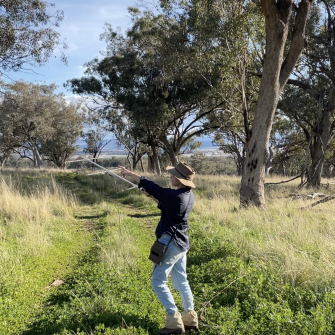Graduate Certificate in Physics for Science Teachers
- Commencing Terms
- Summer Term & 3
- Duration
- 0.5 - 0.7 Year(s)
- Delivery Mode
- Online
- Campus
-
Kensington
- Codes
- Program code 7440
- CRICOS code -
-
2026 Indicative first year full fee
- $20,000*
-
2026 Indicative full fee to complete degree
- $20,000*
-
2026 Indicative first year full fee
- $30,000*
-
2026 Indicative full fee to complete degree
- $30,500*

- Overview
- Entry requirements
- What will I study?
- Future careers
- How to apply
- Fees & Scholarships
Overview
This program is designed for qualified science and mathematics teachers who seek a qualification to teach physics. The courses are entirely online. Each course in this program is designed to be taken sequentially at a rate of one per term, allowing you to continue your work as a teacher while studying. The courses will cover a general introduction to physics as well as specific branches of the discipline: mechanics, electromagnetism, thermal physics and modern physics, enabling you to be confident in your ability to teach physics, explain core concepts and present interesting contexts for applications of the science.
Why study at UNSW?
The Graduate Certificate in Physics for Science Teachers will prepare you to teach physics with flair, understand the core concepts and know how to make it exciting and relevant to your students.
Want to see more from UNSW Science?
Entry requirements
Students must be an accredited teacher with an Australian State Department of Education and have completed one of the following:
- Bachelor of Education in Secondary Science (or equivalent); or
- Bachelor of Education in Secondary Mathematics (or equivalent); or
- Bachelor of Science and Graduate Diploma in Education (or equivalent); or
- Bachelor of Science and Master of Teaching (or equivalent).
Students should have a completed a science major in an area other than physics.
English language requirements
You may be asked to provide evidence of your English proficiency to study at UNSW depending on your educational background and citizenship. English language skills are vitally important for coping with lectures, tutorials, assignments and examinations - this is why UNSW requires a minimum English language competency for enrolment.
If you’re completing an Australian Year 12 qualification (e.g. NSW HSC or equivalent), you do not need to provide anything extra to prove your proficiency. Your qualification will be used as evidence of your English proficiency.
If you do need to provide evidence of your English proficiency, this will be indicated in your application. You can prove this by providing evidence that you meet one or more of the following criteria:
- English language tests and university English courses
- Prior study in the medium of English
- Other qualifications
If you need to improve your English skills before you start your degree, UNSW College’s Academic English Programs are for you. The programs are suitable for various English levels and help you prepare for university studies and life in Australia.
For more details, visit the English Language Requirements page.
Students must be an accredited teacher with an Australian State Department of Education and have completed one of the following:
- Bachelor of Education in Secondary Science (or equivalent); or
- Bachelor of Education in Secondary Mathematics (or equivalent); or
- Bachelor of Science and Graduate Diploma in Education (or equivalent); or
- Bachelor of Science and Master of Teaching (or equivalent).
Students should have a completed a science major in an area other than physics.
English language requirements
You may be asked to provide evidence of your English proficiency to study at UNSW depending on whether you are from an English-speaking background or non-English speaking background. English language skills are vitally important for coping with lectures, tutorials, assignments and examinations - this is why UNSW requires a minimum English language competency for enrolment.
If English is not your first language, you’ll need to provide proof of your English proficiency before you can be given an offer to study at UNSW. You can do this by providing evidence that you meet one or more of the following criteria:
- English language tests and university English courses
- Prior study in the medium of English
- Other qualifications
If you need to improve your English skills before you start your degree, UNSW College’s Academic English Programs are for you. The programs are suitable for various English levels and help you prepare for university studies and life in Australia.
For more details, visit the English Language Requirements page.
Check the specific English language requirements for this program
Full program structure
This graduate certificate will teach qualified teachers the relevant course content to become confident in presenting physics to high school students. Your graduate certificate will give you the tools by to clearly explain core concepts and present interesting contexts for applications of physics.
The first course is an introductory, entirely online unit that will serve as a general introduction to physics. The remaining three courses focus on giving school teachers a more in-depth understanding of some of the different branches of physics: mechanics, electromagnetism, thermal physics and modern physics.
The courses in this graduate certificate are designed to be taken sequentially at a rate of one per semester.
You'll learn:
- Everyday Physics for Teachers
- Mechanics for Teachers
- Electromagnetism for Teachers
- Modern and Thermal Physics for Teachers
Future careers
Secondary School Teacher
Accreditation
On completion of this degree you will be able to apply for accreditation with NESA to teach physics.
How to apply
Applications must be submitted through our Apply Online portal. We encourage you to submit your completed application as early as possible to ensure it will be processed in time for your preferred term. Some high-demand programs and Faculties with limited places may have an earlier application deadline or commencement date. Find out more.
Ready to start your application?
For most international students, applications are submitted via our Apply Online service. We encourage you to submit your completed application as early as possible to ensure it will be processed in time for your preferred term.
Some high-demand programs with limited places, may have an earlier application deadline or may have an earlier commencement date. For details, visit the international admissions information page.
Ready to start your application?
Fees & Scholarships
*Fees are subject to annual review (or when required) by the University and may vary accordingly.
Indicative fees are a guide only and have been calculated based on the typical enrolment patterns of students undertaking the program. The indicative fees listed here is an estimate for tuition only and excludes non-tuition fees and charges. The amount you pay will vary depending on the calendar year of enrolment, the courses you select and whether your study load is more or less than 1 Equivalent Full Time Student Load (48 units of credit (UOC) per year).
You should not rely on indicative fees as fee increases are assessed when required and may exceed the indicative figures listed here. Actual fees are calculated on enrolment. More information on fees can be found at the UNSW fees website.
*Fees are subject to annual review by the University and may increase annually, with the new fees effective from the start of each calendar year. The indicative fees listed here are based on an estimated average and are for tuition only, other fees and charges are not included. The amount you pay will vary depending on the calendar year to enrol, the courses you select and whether your study load is more or less than 1 Equivalent Full Time Student Load (8 courses per year).
Indicative fees are a guide for comparison only based on current conditions and available data. You should not rely on indicative fees. More information on fees can be found at the UNSW fees website.
Indicative fees to complete the program have been calculated based on a percentage increase for every year of the program. Fee increases are assessed annually and may exceed the indicative figures listed here.
Indicative fees to complete the program include tuition plus an estimate of study-related costs of approximately $1,000 per year. To find out more about other costs, visit UNSW International.
Scholarships
At UNSW, we award over $83 million in scholarships each year. We pride ourselves on rewarding excellence and making university accessible to students from all walks of life. Whether you’re a domestic or international student, our range of scholarships, prizes and awards can support your journey.
Progress starts here – at a world-leading university

Top 20 Worldwide
Ranked in the global top 20 for three consecutive years
QS World University Rankings, 2024–2026

Winner of the AFR Most Employable University Award six years in a row
AFR Top100 Future Leaders Awards, 2020–2025

Australia's #1 for Innovation
Highest number of startups and spinouts from university-developed tech
SCOPR report, 2024






